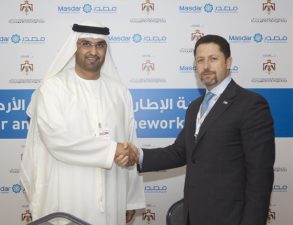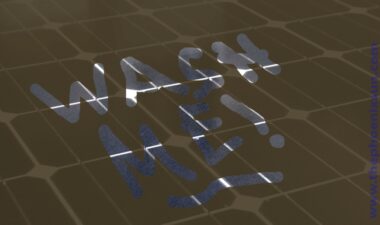
Adolescent men in the DRC (Democratic Republic of Congo) are recruited by warlords because they are desperate. A new German fund will help keep farming in the family and guys like this in his father’s arms. Bigger steps are needed from the top down: Investing in renewables is the answer.
Mass migration of people suffering from conflict and climate change –– from Syria to Iraq to Yemen, to all over countries in Africa –– worries Europe. Climate change messes up water resources, limits agriculture; it promotes famine and exacerbates pest infestations like the locust attack weighing down on Africa and the Middle East right now.
Good news from our hardworking neighbors in Germany – the German Federal Ministry for Economic Cooperation and Development (BMZ) through the German Development Bank KfW, has just given $54 million USD in aid to help keep young Congo men out of the hands of warlords.
The aid will help the people in the Kivu provinces of the Democratic Republic of the Congo, also known as the DRC. The DRC is arguably the most mineral-rich country in the world – laden with gold, diamonds, copper, lithium, while conversely years of conflict and poor management has kept its people dirt poor.
Strengthening Smallhold Farmers
The aid money sent by Germany will support over 180,000 people living in rural areas – most of them smallholder farmers – in Walikale territory in North Kivu and Mwenga and Walungu territories in South Kivu.
The farmers will receive assistance to strengthen their agricultural production and post-harvest management, diversify their income generating activities, and improve nutrition and basic social services, the FAO tells us. This, in turn, will contribute to peace and stability in the region.
We hope.
And for Germany and other European countries that means less trouble for them in terms of migrants and refugee absorption, and more economic stability globally. No one wants to see Africa suffer and it’s high time we help all the African nations out of the mess.
Stopping warlords through farming
Besides being mineral rich, the DRC is one of the most fertile countries on earth and has great agricultural potential with approximately 80 million hectares of arable land – the second-largest cultivable area in the world after Brazil. It is also home to approximately half of the continent’s water resources. Yet, its potential remains largely unexploited and it remains one of the poorest countries in the world.
In North and South Kivu, the socio-economic fabric has been destroyed by decades of conflict, displacement and recurring agricultural and climate shocks. Local warlords often take advantage of adolescents’ vulnerability and low levels of education to enroll them in armed groups.
“Without food security, there can be no peace,” said Aristide Ongone Obame, the FAO representative in the DRC.
The Food and Agriculture Organization of the United Nations (FAO), UNICEF, and the United Nations World Food Programme (WFP) in the east of the DRC will be distributing the aid: “This joint programme offers us the opportunity to break this cycle through building resilience – making households, communities and national systems better equipped to prevent and cope with similar shocks in the future in ways that support economic and social development, preserve integrity and protect children,” said Edouard Beigbeder from UNICEF.

Smallhold farmers, often women
The Government of Germany has been supporting resilience building activities in the Kivus since 2017 with a contribution of $40 million USD through a joint program now winding down. The new programme will build on the successes of this programme, which has reached more than 400,000 people.
Time to invest in renewables in Africa?
It’s time for some contributions from the Middle East and Arab world. Maybe some Arab loan incentives to get renewable energy into the mining industry?
A number of gold mining companies, including one of the world’s biggest – Barrick Gold (TSX: ABX; NYSE: GOLD) is actively mining in the DRC. Barrick has said over and over again that Environmental, Social and Governance (or CSR) is essential, not an option, in the mining industry. So they could be excellent partners to work with.

Catherine Raw, Barrick Gold: ESG is no longer an option.
According to Catherine Raw, Chief Operating Officer, North America for Barrick Gold, it’s time for gold mining companies to wake up: that investors are aware of and actually want corporate social responsibility (CSR) or ESG criteria to be met when they invest: She tells the Northern Mining News: “ESG is not a new phrase, corporate governance, social responsibility, licence to operate, sustainability: these are all words that have been going on well at least since I came out of university.
“When you own a supermarket, or you own a retailer, or you own a tech company,” she explains, “you don’t have the same kind of exposures. However, this can be a driver or has the potential to drive M&A activity because investors are identifying management teams they trust, those management teams who are able to mitigate or manage the risks associated with ESG issues successfully and have a track record to do so.
“And those companies that slip up, are getting punished in a far greater way than they ever have done in previous cycles,” she cautions.
If you look at Barrick investor reports, you will notice that more than half of it focuses on the contributions they give back to society. You can see their sustainability section on their website. So gold might be the boost: Gold is a finite resource and in times of trouble (like coronavirus) investors are looking to put their money into the stability of gold.
A golden opportunity for national solar and wind power projects?
Barrick has JVs with a number of young gold companies and exploration companies out of Canada including Loncor in Toronto (TSE:LN). Canada, as a resource-rich country that knows how to operate mines, and the Arab world as an oil producer that clearly needs to diversify away from oil, could be great partners in turning the DRC –– and all of Africa at large –– into a renewable energy hub that sends power to all of Africa and parts of Europe. Financing renewable energy projects is not charity. It’s a means of investing and doing good at the same time.
On the sunbelt, mineral rich with gold and diamonds, all parties involved could reap the rewards, as well as local communities near the mines.This article here points out how microgrids, led by mining companies, can be the future and increase corporate dividends.
But meanwhile, aid is still needed to fend off immediate hunger and troubles and build resilience until this bold plan will take root – pulling sun and wind from Africa and turning it into renewable energy across continents.
NASA dreamt it up, then the US Department of Energy, and most recently the Desertec project that never got off the ground. A new mix of dreamers, financing partners from the western east, and the mining industry to believe in it, will help this bold plan hold. What do you think?



